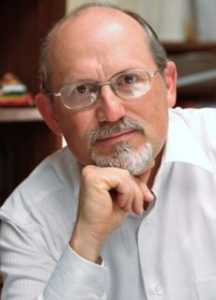
David Cheung will present one of the papers at the Evangelical Missiological Society gathering April 6.
Have missionaries also been agents of secularization even as they have sought to introduce the gospel? How does the reaction of religious fundamentalism and terrorism to secularization affect the way we approach missions?
Those are among the questions which will be examined at the annual meeting of the Evangelical Missiological Society (EMS) early next month.
Mark Naylor, coordinator of the Centre for Intercultural Leadership Development (CILD) at Northwest Baptist Seminary, describes the purpose of the EMS and the major focuses of the conference.
Evangelicals are particularly concerned to be involved in God’s mission in order to bring gospel transformation in the world. The Evangelical Missiological Society in North America is a good expression of that concern. EMS seeks to bring churches, mission agencies and Christian colleges and seminaries together to reflect on our role as God’s people who are engaged in his mission within a turbulent and ever-changing world.
As stated on the EMS Canada webpage:
The purpose of the Canada region of the Evangelical Missiological Society is to provide a forum once a year for Canadian missiologists and practitioners to engage each other around relevant topics in missions. This is motivated by a felt need for “dialogue, fellowship and cooperation among evangelicals devoted to researching, publishing and instructing in areas related to the mission of the Church.”
EMS is looking to create dialogue between mission practitioners, active believers in local churches and the academy so that productive pathways in mission can be identified, researched and communicated.
The annual meeting of Canada EMS will be held on the Trinity Western University campus April 6, concurrent with four other centres across Canada. It will feature three streamed plenary sessions and four live papers. This year’s theme is Mission and Evangelism in a Secularizing World.
A number of key questions related to this theme are being explored by the presenters of the papers:

Joanne Pepper
1. Do missionaries destroy culture?
Have missionaries also been agents of secularization even as they have sought to introduce the gospel? If so, how can this be identified and addressed?
Dr. Joanne Pepper asks this question in her paper, “Do missionaries destroy culture?” She evaluates current and historical case studies in order to illustrate both positive and negative social change.
An important concern is to challenge negative stereotypes while focusing an honest and critical lens on past actions in order to provide a profitable guide for current mission practice.
2. Secularization, globalization, diasporas and terrorism
How does the reaction of religious fundamentalism and terrorism to secularization affect the way we approach missions? Rev. Dr. Amador Remigio addresses this concern in his paper “Secularization, globalization, diasporas and terrorism: realities, implications and imperatives for Christian missions and evangelism in the 21st century.”
He analyzes the “driving factors” of terrorism and explains how terrorist acts cause a destabilization of individuals and society. From these current global realities he proposes some “inescapable imperatives” for Christian mission along with possible fruitful courses of action for the church.
3. The exodus of GenX’s and Millennials from Canadian churches
Dr. David Cheung considers the question of how evangelism can be contextualized to respond to the influences of secularization in Canadian setting through his paper, “The exodus of GenX’s and Millennials from Canadian churches: Implications for evangelism in a secular multicultural context.”
He considers the role of secularization in causing GenX and Millennials to leave the church, the particular shape of the Canadian context that makes the challenges of secularization unique and then considers how such a context both hinders and facilitates the spread of the gospel message. In particular, he proposes possible responses that can aid the task of evangelism.
4. Discipleship in a secularizing culture
The question of how discipleship can be addressed in a secularizing culture is the topic of a paper by Steven Shetterly and Dr. Rhonda M. McEwen: “Their Eyes Were Opened: A Holistic Epistemology for Missional Discipleship.”
The authors claim that “anemic discipleship” in Christian mission is caused by a faulty epistemology. The modern worldview clashes with the traditional ways of thinking privileged within Christian circles leading to a lack of understanding on both sides.
The paper suggests that a more holistic “incarnational and interpersonal view of knowledge” can challenge and impact secular ways of thinking leading to “whole-life discipleship.”

Mark Naylor
The hope for our meeting on April 6 is that those interested in God’s mission, whether missiologists, practitioners or dedicated supporters of missions, will all come together to reflect on and interact with these papers that address the current challenges and opportunities God has given us.
Mark Naylor DTh is coordinator of the Centre for Intercultural Leadership Development (CILD) at Northwest Baptist Seminary, which is part of ACTS Seminaries on the Trinity Western campus. He served along with Karen, his wife, with Fellowship International for 14 years, doing evangelism, church planting and leadership development.
He can be reached at Mark.naylor@twu.ca
